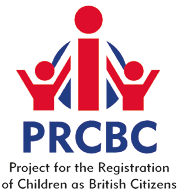Many children born in the UK or with lengthy residence here have a right in law to register as British citizens, but it is sometimes either wrongly assumed that the child is already British or misunderstood that the child has a right to British citizenship. Among the children affected, are children born in the UK to European citizens, stateless children born in the UK and looked after children. For an insight into Parliament’s intention when introducing the British Nationality Act 1981, please see Commentary_ Hansard BNA 1981 _registration_Aug 2018.
It is extremely important for children to register their citizenship rights promptly. Please see our Booklet “Children and their rights to British Citizenship” for Parents, Carers and Children:
Children and their Rights to British Citizenship
British citizenship to a child and young adult is about identity, sense of belonging, confirmation that this is their home, having the same rights and feeling part of their peer group and much more.
British citizenship also means that the child or young adult secures all the advantages of citizenship, including the right to live in the UK, freedom from immigration control, access to student loans, employment, health services and other social benefits. At worst, a child or young adult who is not registered is at risk of being removed from the UK, their home country, often to a place they have barely lived in, if at all, and may know nothing about.
The importance of British citizenship is emphasised by the alienating impact upon children growing up in the UK, who identify themselves as British, of being without that citizenship. This was confirmed by the High Court’s factual findings in PRCBC, O & A v Secretary of State for the Home Department [2019] EWHC 3536 (Admin), where the court concluded that a “mass of evidence” showed children to “feel alienated, excluded, isolated, ‘second-best’, insecure and not fully assimilated into the fabric and social culture of the UK.“
Such an impact is plainly not in children’s best interests. It is the very opposite of Parliament’s intention in establishing rights to British citizenship.
The Secretary of State on her British citizenship application form guide also points out that:
“Citizenship is a ‘significant life event’. Apart from allowing a child to apply for a British citizen passport, British citizenship gives them the opportunity to participate more fully in the life of their local community as they grow up.“
From our own experience, and the experience of those who work with children and young adults, it is of great psychological importance to be registered as a British citizen. Doing so gives young people a greater sense of identity in the UK (see pages 22-29 of legal research report: Systemic obstacles to children’s registration as British Citizens).
Estimates have indicated that there may be 120,000 young people living in the UK without the legal right to reside under current immigration laws, with the majority born in the UK.
Why are children not being registered as British Citizens?
Our legal research in 2014 confirmed that many children born in the UK or living here from an early age did not have British citizenship or any leave (permission) to remain in the UK. However, many of the children were entitled to British citizenship; and other children, while not entitled, could be granted citizenship at the discretion of the Home Office. From that time, we have been working to secure these citizenship rights of children.
Some children neither know they do not have permission to be in the UK nor know that they may apply for citizenship. Similarly, parents, foster parents and corporate parents (social services) often do not know these things; and in some cases even appear to prefer not to know.
Among key problems are:
- No steps taken by those responsible for the welfare of a child to enable the child to exercise their right to be registered as a British citizen
- Lack of awareness among children, parents and others working with children
- Unaffordability of the registration application fee of £1,431 for young people (18 or over); and concerns about the accessibility of the fee waiver introduced from 16 June 2022 for children who cannot afford the registration application fee of £1,214.
- Gathering evidence, which may be complex and costly
- Absence of legal aid for advice and assistance in registration applications
- Poor decision-making by Home Office, poor application of discretion, poor guidance, absence of consideration of section 55 of the Borders, Citizenship and Immigration 2009 Act, UNCRC duties and/or the right to private life
- If refused registration, there is also no legal aid for advice and assistance at the Home Office internal review stage and a £372 Home Office review fee is required
- Application of the good character requirement for children aged 10 or over (and Home Office guidance that treats children the same adults; and treats registration rights the same as naturalisation). See reference material on children’s citizenship claims and the good character requirement: https://prcbc.org/research/
